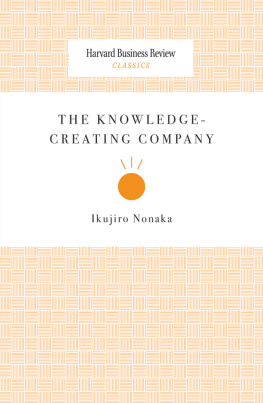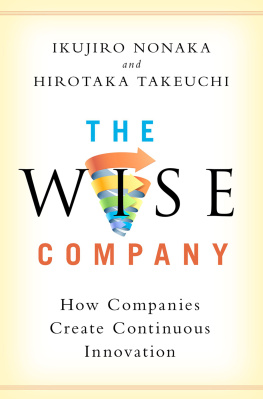Nonaka - The Knowledge-Creating Company
Here you can read online Nonaka - The Knowledge-Creating Company full text of the book (entire story) in english for free. Download pdf and epub, get meaning, cover and reviews about this ebook. year: 2008, publisher: Harvard Business Review Press, genre: Business. Description of the work, (preface) as well as reviews are available. Best literature library LitArk.com created for fans of good reading and offers a wide selection of genres:
Romance novel
Science fiction
Adventure
Detective
Science
History
Home and family
Prose
Art
Politics
Computer
Non-fiction
Religion
Business
Children
Humor
Choose a favorite category and find really read worthwhile books. Enjoy immersion in the world of imagination, feel the emotions of the characters or learn something new for yourself, make an fascinating discovery.
The Knowledge-Creating Company: summary, description and annotation
We offer to read an annotation, description, summary or preface (depends on what the author of the book "The Knowledge-Creating Company" wrote himself). If you haven't found the necessary information about the book — write in the comments, we will try to find it.
Nonaka: author's other books
Who wrote The Knowledge-Creating Company? Find out the surname, the name of the author of the book and a list of all author's works by series.
The Knowledge-Creating Company — read online for free the complete book (whole text) full work
Below is the text of the book, divided by pages. System saving the place of the last page read, allows you to conveniently read the book "The Knowledge-Creating Company" online for free, without having to search again every time where you left off. Put a bookmark, and you can go to the page where you finished reading at any time.
Font size:
Interval:
Bookmark:
THE
KNOWLEDGE
CREATING
COMPANY
Harvard Business Review
CLASSICS
THE
KNOWLEDGE
CREATING
COMPANY
Ikujiro Nonaka
Harvard Business Press
Boston, Massachusetts
Copyright 2008 Harvard Business School Publishing Corporation Published in Harvard Business Review in 1991 and 2007
Reprint #R0707n
All rights reserved
Printed in the United States of America
12 11 10 09 08 5 4 3 2 1
No part of this publication may be reproduced, stored in or introduced into a retrieval system, or transmitted, in any form, or by any means (electronic, mechanical, photocopying, recording, or otherwise), without the prior permission of the publisher. Requests for permission should be directed to , or mailed to Permissions, Harvard Business School Publishing, 60 Harvard Way, Boston, Massachusetts 02163.
ISBN 978-1-4221-7974-1
Library-of-Congress cataloging information forthcoming
The paper used in this publication meets the requirements of the American National Standard for Permanence of Paper for Publications and Documents in Libraries and Archives Z39.48-1992.
THE HARVARD BUSINESS REVIEW CLASSICS SERIES
Since 1922, Harvard Business Review has been a leading source of breakthrough ideas in management practicemany of which still speak to and influence us today. The HBR Classics series now offers you the opportunity to make these seminal pieces a part of your permanent management library. Each volume contains a groundbreaking idea that has shaped best practices and inspired countless managers around the worldand will change how you think about the business world today.
THE
KNOWLEDGE
CREATING
COMPANY
Editors Note:
This 1991 article helped popularize the notion of tacit knowledgethe valuable and highly subjective insights and intuitions that are difficult to capture and share because people carry them in their heads. Years later, the piece can still startle a reader with its views of organizations and of the types of knowledge that inform them.
For example, the advice on how to distill objective and transferable, or explicit, knowledge from tacit knowledgewith a vivid illustration of Matsushita Electrics efforts to build a better bread-making machineis both arresting and actionable. The next step: ensuring that explicit knowledge is translated back into tacit knowledge that will then go on to yield yet another innovative solution.
I n an economy where the only certainty is uncertainty, the one sure source of lasting competitive advantage is knowledge. When markets shift, technologies proliferate, competitors multiply, and products become obsolete almost overnight, successful companies are those that consistently create new knowledge, disseminate it widely throughout the organization, and quickly embody it in new technologies and products. These activities define the knowledge-creating company, whose sole business is continuous innovation.
And yet, despite all the talk about brainpower and intellectual capital, few managers grasp the true nature of the knowledge-creating companylet alone know how to manage it. The reason: they misunderstand what knowledge is and what companies must do to exploit it.
Deeply ingrained in the traditions of Western management, from Frederick Taylor to Herbert Simon, is a view of the organization as a machine for information processing. According to this view, the only useful knowledge is formal and systematic hard (read: quantifiable) data, codified procedures, universal principles. And the key metrics for measuring the value of new knowledge are similarly hard and quantifiableincreased efficiency, lower costs, improved return on investment.
But there is another way to think about knowledge and its role in business organizations. It is found most commonly at highly successful Japanese competitors like Honda, Canon, Matsushita, NEC, Sharp, and Kao. These companies have become famous for their ability to respond quickly to customers, create new markets, rapidly develop new products, and dominate emergent technologies. The secret of their success is their unique approach to managing the creation of new knowledge.
To Western managers, the Japanese approach often seems odd or even incomprehensible. Consider the following examples:
How is the slogan Theory of Automobile Evolution a meaningful design concept for a new car? And yet, this phrase led to the creation of the Honda City, Hondas innovative urban car.
Why is a beer can a useful analogy for a personal copier? Just such an analogy caused a fundamental breakthrough in the design of Canons revolutionary mini-copier, a product that created the personal copier market and has led Canons successful migration from its stagnating camera business to the more lucrative field of office automation.
What possible concrete sense of direction can a made-up word such as optoelectronics provide a companys product-development engineers? Under this rubric, however, Sharp has developed a reputation for creating first products that define new technologies and markets, making Sharp a major player in businesses ranging from color televisions to liquid crystal displays to customized integrated circuits.
In each of these cases, cryptic slogans that to a Western manager sound just plain silly appropriate for an advertising campaign perhaps but certainly not for running a companyare in fact highly effective tools for creating new knowledge. Managers everywhere recognize the serendipitous quality of innovation. Executives at these Japanese companies are managing that serendipity to the benefit of the company, its employees, and its customers.
The centerpiece of the Japanese approach is the recognition that creating new knowledge is not simply a matter of processing objective information. Rather, it depends on tapping the tacit and often highly subjective insights, intuitions, and hunches of individual employees and making those insights available for testing and use by the company as a whole. The key to this process is personal commitment, the employees sense of identity with the enterprise and its mission. Mobilizing that commitment and embodying tacit knowledge in actual technologies and products require managers who are as comfortable with images and symbolsslogans such as Theory of Automobile Evolution, analogies like that between a personal copier and a beer can, metaphors such as optoelectronics"as they are with hard numbers measuring market share, productivity, or ROI.
The more holistic approach to knowledge at many Japanese companies is also founded on another fundamental insight. A company is not a machine but a living organism. Much like an individual, it can have a collective sense of identity and fundamental purpose. This is the organizational equivalent of self-knowledgea shared understanding of what the company stands for, where it is going, what kind of world it wants to live in, and, most important, how to make that world a reality.
In this respect, the knowledge-creating company is as much about ideals as it is about ideas. And that fact fuels innovation. The essence of innovation is to re-create the world according to a particular vision or ideal. To create new knowledge means quite literally to re-create the company and everyone in it in a nonstop process of personal and organizational self-renewal. In the knowledge-creating company, inventing new knowledge is not a specialized activitythe province of the R&D department or marketing or strategic planning. It is a way of behaving, indeed a way of being, in which everyone is a knowledge workerthat is to say, an entrepreneur.
The reasons why Japanese companies seem especially good at this kind of continuous innovation and self-renewal are complicated. But the key lesson for managers is quite simple: much as manufacturers around the world have learned from Japanese manufacturing techniques, any company that wants to compete on knowledge must also learn from Japanese techniques of knowledge creation. The experiences of the Japanese companies discussed below suggest a fresh way to think about managerial roles and responsibilities, organizational design, and business practices in the knowledge-creating company. It is an approach that puts knowledge creation exactly where it belongs: at the very center of a companys human resources strategy.
Next pageFont size:
Interval:
Bookmark:
Similar books «The Knowledge-Creating Company»
Look at similar books to The Knowledge-Creating Company. We have selected literature similar in name and meaning in the hope of providing readers with more options to find new, interesting, not yet read works.
Discussion, reviews of the book The Knowledge-Creating Company and just readers' own opinions. Leave your comments, write what you think about the work, its meaning or the main characters. Specify what exactly you liked and what you didn't like, and why you think so.







